Stranded Iranian migrant Hamid, 34, an electrical engineer from the
Iranian town of Sanandij, sits on rail tracks in front of Macedonian riot
police guarding the borderline between Greece and Macedonia near the
Greek village of Idomeni on Monday: photo by Yannis Behrakis / Reuters, 23 November 2015
"Every day, two Alan Kurdis die on
this journey"
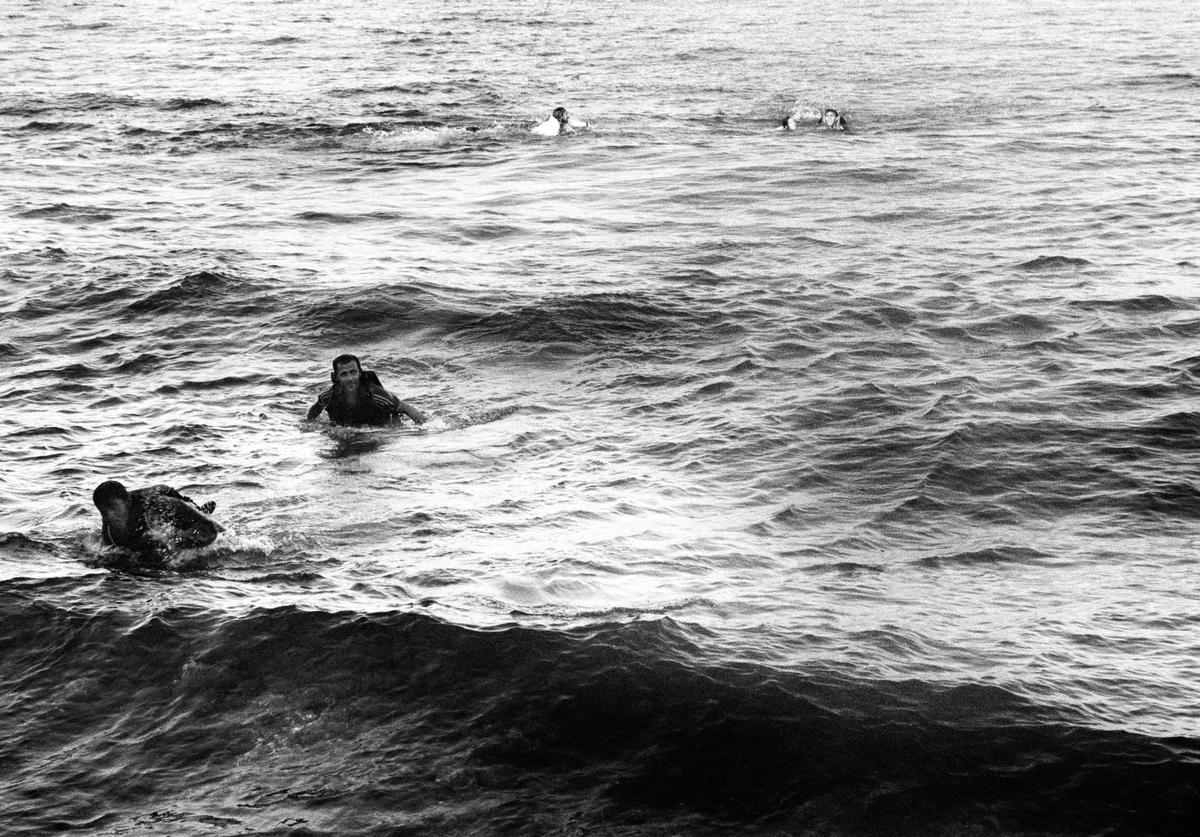
Greece: 703,374 arrived by sea in 2015. 101,736 in November. image via Melissa Fleming Verified account @melissarfleming, 22
November 2015
Peter Bouckeart, Emergencies Director, Human Rights Watch, interviewed by Amy Goodman for Democracy Now! 23 November 2015
PETER BOUCKAERT: Several of the attackers have come from a marginalized suburb of Brussels, called Molenbeek. Where the attack appears to have been planned, and where many other prior terrorist attacks were also planned. It’s also a weapons shipment -- a place where weapons are very easily available. And I think there’s two lessons to be drawn from this aspect. The first is that it’s -- and that’s an important lesson for the United States. When we do take refugees -- or migrants, for that matter -- it’s very important to integrate them into our societies, to give them the language skills and the support they need to become productive members of our societies. And one of the gravest mistakes that Europe has made, several decades ago, is to put people in these marginalized ghettos, basically, where extremism has built. So that’s why it’s so dangerous, the policies that U.S. governors are adopting, because they cannot stop these refugees from coming to their states -- that’s a federal decision -- but they can stop them from having the support they need to be integrated into their communities, and that could actually present a threat in the future.
AMY GOODMAN: Talk more about Molenbeek.
PETER BOUCKAERT: So it is a neighborhood where weapons are easily available.
AMY GOODMAN: Why?
PETER BOUCKAERT: Because Belgium has been a center for the illegal weapons trade for decades. It’s where shipments to conflicts like Angola, traditionally, have taken off. And that commerce has led to the easy availability of weapons. And that is a very dangerous development, because for just a few thousand dollars, you can buy Kalashnikovs and other weapons of war on the black market in Belgium.
AMY GOODMAN: Were you surprised when you heard about this connection between the Paris attackers, some of them, and Molenbeek in Brussels, Belgium?
PETER BOUCKAERT: I was not really surprised, because I’ve been working on the Syrian conflict for many years, and we have seen many people from these areas of Belgium and France heading to fight in Syria. And, you know, there’s been this focus on this fake passport, when Europe really should be focusing more on the marginalized Muslim communities at home and try to better meet their needs, make sure that young people are educated and have jobs available, because the reality is that the majority of these people who carried out the Paris attacks were French citizens -- some of them resident in Molenbeek -- who have been living in France all of their lives.
AMY GOODMAN: Tell us the stories of people. I don’t think people care about refugees when you say one million, when say 1000, until you hear the story of one person.
PETER BOUCKAERT: I have met so many people with their own tragic and at times inspiring stories. I have met many Syrians who made this boat journey and then actually stayed in Greece to help their fellow Syrians when they arrived. But one person who touched me quite a bit is a doctor from Syria, Dr. Ali Jabour. He made this journey and I met him about two months ago in Hungary where he was sleeping on the streets. And just imagine you’ve spent four years in Syria, digging people out of the rubble and saving their lives at the hospital -- you're a hero, really, and you end up on this journey of utter humiliation. I wrote about him, and my last line of the piece I wrote said he’s now in Austria, one step closer to achieving his dream of continuing his medical studies in Germany. And he contacted me from Germany and said, actually, the last line is not right, because my dream is to be back in Syria.
AMY GOODMAN: Tell us the journey he took. Explain how people go from Syria.
PETER BOUCKAERT: So for most of these people, they have to sell their land and their house and borrow very heavily from neighbors and from family to make this journey because they have to pay smugglers incredible amounts of money. Then they have to cross the border into Turkey, often illegally, over razor wire fences, and then they have to make their way to the smugglers, who they pay about $1200 at least, sometimes much more, to be pushed onto these boats. And all of them are being told the journey will be safe, there will be 30, 35 people on the boat. But when they arrive on the coast, up to 55, 60 people are pushed onto these boats. And the smugglers have guns to force people to take off. There’s nobody to guide these boats. One of the refugees is given the handle of the engine on this rubber boat, and then they set out at sea. Many of the boats break down at sea and drift for hours. We’ve talked to people who have been at sea for as long as two days. Sometimes the boats are attacked by vigilantes.
AMY GOODMAN: And where do they go in this boat journey?
PETER BOUCKAERT: They go from Turkey, from the Turkish coast to the Greek islands. And the numbers have been growing exponentially. In July, 24,000 people arrived on the island of Lesbos. In August, it was up to 50,000. And by September, it was 111,000.
AMY GOODMAN: So how many a day?
PETER BOUCKAERT: It can be up to 5000, 8000 people a day. So that means 100 boats.
AMY GOODMAN: A hundred boats.
PETER BOUCKAERT: And you just do the math. I did the math, and the smugglers are making over $100 million off the plight of these people.
AMY GOODMAN: And then what happens when they end up in Lesbos? What happens then?
PETER BOUCKAERT: You know, for many, they think that their journey -- the worst part of their journey is over when they arrive in Lesbos. But actually, their suffering is just about to begin. When they get on the beach, wet and often cold, they’re helped by the volunteers. They are given dry clothes if dry clothes are available. And then they end up in these horrible camps, completely overcrowded with very little shelter and food, where they have to wait for days just to get a registration paper to get onto the boat to Athens. And then they continue, sleeping out in the open with their children -- it’s stunning to see how many babies are on this journey, and toddlers -- for day after day after day until they ultimately reach Germany.
And, you know, I think the real scandal is that we’re now five months, a year into this crisis, that keeps growing, but there still is no organized EU response, both in terms of coherent refugee policies, but also in terms of saving lives at sea and meeting the humanitarian needs of these people. This is not an insurmountable task. I mean, OK, we’re talking about a maximum of 8000 people a day, which seems like a huge number, but we handle those kind of crowds every day at rock concerts, at soccer matches. We do have the capacity to address these people’s needs and to make this journey a lot more humane, but we’re not.
AMY GOODMAN: How have the Paris attacks complicated this whole situation, the horror for refugees? I wanted to turn just in the United States to Donald Trump, the repub -- one of the leading presidential candidates, Republican candidates, speaking Monday after the Paris attacks.

Fear throws its hat into the ring for 2016 race: image via Reuters Opinion @ReutersOpinion, 23 November 2015
DONALD TRUMP: With all of the problems -- and you probably heard that at least one, and probably more, of the killers, the animals, that did what they did in Paris, came out of the migration, right? They came out of the migration. So we have a president that wants to take hundreds of thousands -- hundreds of thousands of people and move them into our country. And we don’t -- no, think of it. And we don’t even know who they are. There’s no paperwork. There’s no anything.
AMY GOODMAN: That’s Donald Trump. Peter Bouckaert?
PETER BOUCKAERT: Well, I normally make a policy not to respond to such idiotic statements. But in reality, every Syrian refugee who reaches the United States has gone through four levels of security review. These are the most carefully screened refugees anywhere in the world. And there have been no incidents with the hundreds of thousands of refugees that the U.S. has taken in over the years. The United States’ values are built about being welcoming to refugees. And it’s our most powerful tool in the war against Islamic extremism, are our values. It’s not our military planes and our bombs. The only way we can fight against this brutality, this barbarism, is with our values. And if we’re going to shut the door on these refugees, we’re giving a propaganda victory to ISIS. And I think that’s exactly why they left a fake Syrian passport at the scene of their attacks, because they would love it if we shut the door on the people who are fleeing their so-called Islamic caliphate.
AMY GOODMAN: What happens to Afghan refugees?

Just taking the bus is an increasingly deadly enterprise for Afghanistan's Shia Hazara: image via Kenneth Roth @KenRoth, 23 November 2015
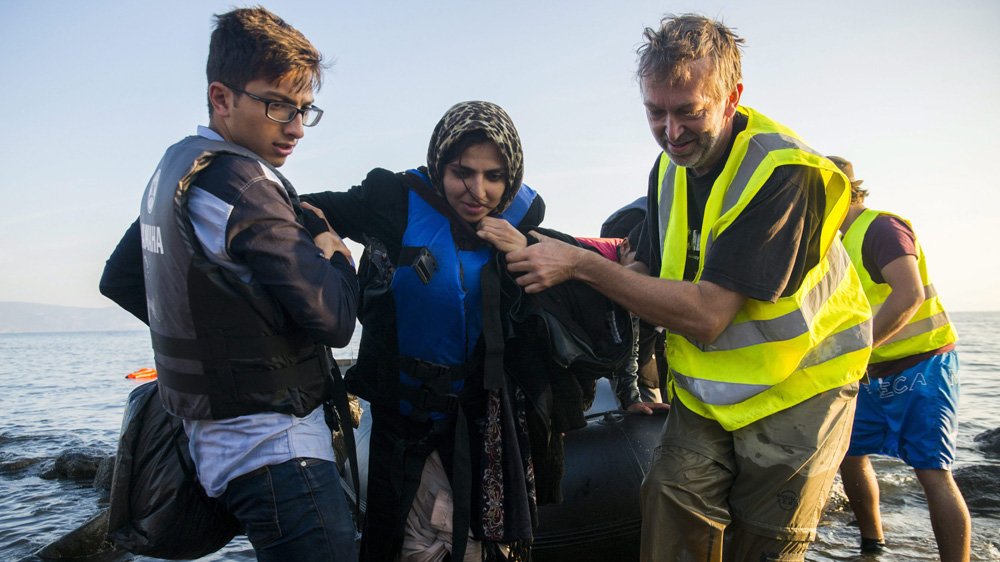
Severe persecution in Afghanistan explains why so many Afghans arriving in Lesbos are Hazara: image via Kenneth Roth @KenRoth, 23 November 2015
PETER BOUCKAERT: You know, I think a lot of the focus has been on the Syrian refugees and their plight. But as one Afghan refugee told me, the Syrians have had four years of war, now coming onto five. We’ve had 40. And we should not ignore the plight of the people fleeing Afghanistan. The Taliban is resurgent in Afghanistan. The Islamic State is also targeting people there. And there’s many abuses being committed by the Northern Alliance. But the Afghan refugees also are fleeing from Iran. There’s millions of Afghans who live in Iran, and one of the reasons they’re fleeing from Iran, which is a very little-known fact, is that Iran is actually forcibly recruiting them to go fight in Syria. They’re rounding up Afghan refugees and giving them the choice between being deported back to Afghanistan, a country many have not lived in for decades and fear, or being forced to go fight for Assad in Syria.
AMY GOODMAN: I want to continue on this track, this idea of what has caused people to flee and what our responsibility is, not just as human beings that are not attached except that we’re humans and care about other human beings, but our responsibility for the cause of the refugee crisis.
PETER BOUCKAERT: You know, I do think it’s important for people to understand that the 2003 Iraq invasion, and especially the very irresponsible policies which were put in place by the Bush administration, played a very direct role in creating the Islamic State. It ripped apart Iraqi state and allowed for the rise of Islamic extremism. The only way we can respond to that is not just with a military strategy, and certainly not with brutality. I mean, we’ve seen that the kind of brutal policies pursued by the Bush administration and Rumsfeld and Cheney utterly failed. They failed on the ground. They achieved nothing in terms of stabilizing Iraq or dealing with the threat of Islamic extremism. So, you know, I totally understand in the aftermath of the Paris attacks people want to respond, they want to go strike against the Islamic State, but we have to be smart and learn from our own history. And actually, our values, respect for human rights and welcoming refugees is an important part of fighting against the kind of Islamic extremism that the Islamic State represents.
AMY GOODMAN: Peter Bouckaert, you were one of the first to tweet the picture of the three-year-old boy. Talk about his case, Alan Kurdi.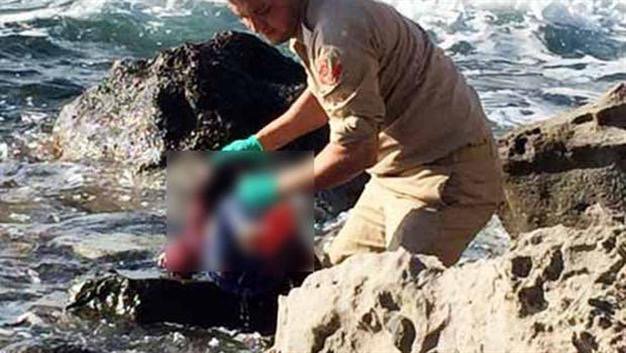
In Aylan's wake, 4-yr.-old Syrian refugee girl found dead off Turkey's Bodrum coast. #Sena: image via Melissa Fleming @melissarfleming, 23 November 2015 Vienna, Austria
PETER BOUCKAERT: You know, Alan Kurdi came from the city of Kobani, which is completely destroyed, partly by the Islamic State, but also by U.S. airstrikes in response to their takeover of the city. He set off --
AMY GOODMAN: The city of Kobani --
PETER BOUCKAERT: Of Kobani.
AMY GOODMAN: In Syria.
PETER BOUCKAERT: In Syria. And he set off on one of these rubber boats and drowned alongside his mother and his brother. Every day, two Alan Kurdis die on this journey. And, you know, the picture of Alan Kurdi certainly drew a lot of attention. It horrified us all. And for a brief moment, it united us in a sense that we have to do something about this crisis. Well, we still have to do something about this crisis. And part of what we need to do about this crisis, the most important part, is making safe and legal ways for people to seek asylum, to get out of the horrors of war, to provide them with the opportunity to educate their children because those children represent the future of Syria. And there -- just in Turkey, there are 400,000 children, Syrian children, out of school --
AMY GOODMAN: Explain.
PETER BOUCKAERT: -- missing out on an education, having fled from Syria. So we need to address this real crisis in the region. You know, even with the projections of the European Union for 2015, 2016 and 2017, the refugees reaching Europe would represent 0.4 percent of the population of Europe. That’s one out of 250 people. You know, in Lebanon, one out of four people is a refugee, a Syrian refugee. So Europe is not being flooded by refugees and certainly the world is not being flooded by Syrian refugees. We can -- this is not a capacity problem. It’s a political problem.
AMY GOODMAN: Explain what the U.S. should do. What are the numbers of refugees the U.S. has taken and should take?
PETER BOUCKAERT: Well, the U.S. takes 70,000 refugees a year, and many of them come from places like Syria and Somalia and Iraq. President Obama has now promised to take 10,000 more Syrian refugees a year. Those people will be carefully screened, and I am certain that they will contribute to American society. You know, I’ve been stunned by the number of doctors and engineers and business leaders that I’ve met on this journey. These people are not coming to take welfare. They want to come and contribute to our societies. They want to build a new future for themselves and for their children. And even in Germany today, the people in the camps, the one thing they ask me for is language books. They want to learn the German language, get out of these camps, and start their new lives.
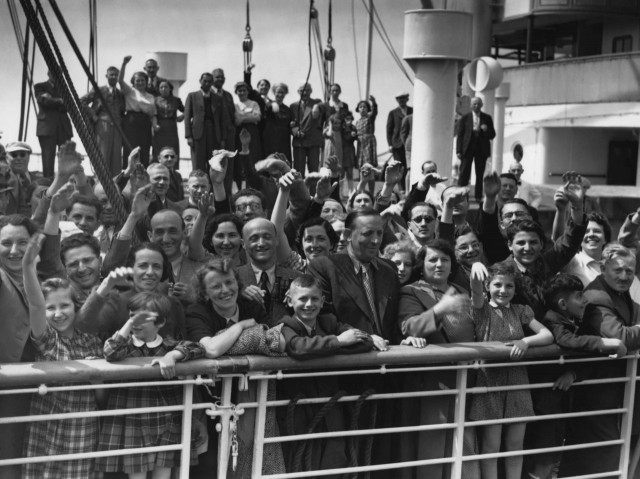
Remember the excuse that Nazi spies would try to enter the United States as Jewish refugees?: image via Kenneth Roth @KenRoth, 23 November 2015
AMY GOODMAN: More than two dozen U.S. state governors have refused to accept Syrian refugees after the Paris attacks. This is one of them. This is Texas Governor Greg Abbott.
GOV. GREGG ABBOTT: The database on the Syrian side simply does not exist. As a result, to the extent any Syrian refugee is allowed into the country, we are playing the same game of risk that Europe played with regard to the individual who entered Europe, who then participated in the terroristic bombing of Paris. As governor of the state of Texas, I will not roll the dice and take the risk on allowing a few refugees in simply to expose Texans to that danger.
AMY GOODMAN: That’s Governor Abbott of Texas. Peter Bouckaert of Human Rights Watch?
PETER BOUCKAERT: Well, I think the facts speak for themselves. There’s 70,000 refugees coming to the United States every year, and not a single one has been involved in a terrorist incident. The situation in Europe is different. There is chaos right now in terms of the procedures, and Europe does need to put together a coherent refugee policy to deal with these people and to screen them for security reasons. But the reality is that the U.S. has screening procedures in place and a coherent refugee policy, and that these people present no threat to the United States.
AMY GOODMAN: This is Governor Bentley of Alabama.
GOV. ROBERT BENTLEY: And I think the thing that I want to do as governor is to make sure the people of Alabama are safe. And if there is any -- if there’s even the slightest risk that the people who are coming in from Syria are not the types of people that we would want them to be, then we can’t take that chance.
AMY GOODMAN: That’s Alabama Governor Robert Bentley. Peter Bouckaert?
PETER BOUCKAERT: Look, I can assure the governor that the people who are going to come from Syria to the United States are exactly the kind of people that we will want to welcome to the United States. I’ve met many people on this journey who I would have loved to have as neighbors. They’re people who are fleeing from conflict. And it’s part of a long-standing U.S. tradition to welcome people who need refuge.
AMY GOODMAN: What do you think is the solution to the conflict in Syria?
PETER BOUCKAERT: The conflict in Syria is a very difficult conflict to resolve. It ultimately needs a political solution. And one of the aspects which is really important is to reassure various minority communities, including the Christians and the Assyrians and the Yazidis, as well as the Alawites, who are the power base of President Bashar al-Assad, that there is a future for them in Syria because many of them are supporting the Syrian government not because they like the policies of Assad, but because they’re fearful for the future. And they have every reason to be because if we look at what happened in Iraq, many of these communities were wiped out. The Yazidis and the Christians just in the last year lost most of their villages.
But there’s other aspects as well. You know, two years ago, I helped organize a conference for women from Syria in Geneva, together with women’s rights activist Madeleine Rees. And it was really the first time that women had had a voice in the peace process. You know, we brought this proposal to the diplomats, and they were like, that’s a great idea.
AMY GOODMAN: And what was the proposal?
PETER BOUCKAERT It was to have a conference of women to talk about what their vision was for the future of --
AMY GOODMAN: And what was their vision?
PETER BOUCKAERT: Their vision was that women had to be around the table, that we could not just have men with guns around the table. But up to that stage, 50 percent of the population of Syria, their voice had been completely ignored in the peace process for Syria. And that happens time and time again. We need to make sure that not just the people with guns are around the table, that they don’t just buy their chair at the table with blood, but that the moral voices from the community and women, civil society leaders who have such much more of a vision for the future of Syria -- and the Congo and all of these other conflicts -- are around the table with a voice.
AMY GOODMAN: You have said that you believe that this fake passport that was planted next to one of the gunmen in Paris, that said they were from Syria but in fact they weren’t, was actually, you believe, a plan of ISIS to make the link.
PETER BOUCKAERT: Yes. You know, ISIS wants people to flock towards its Islamic caliphate. So it really is a rejection of the ideology of ISIS when people are fleeing from the Islamic caliphate. And I’ve met many people from Deir ez-Zor and Raqqa and Mosul who are fleeing the terror of ISIS. So ISIS does want to get Europe to shut the door in the face of these refugees. It really helps ISIS a lot when Muslims are being seen humiliated on the streets of Europe.
AMY GOODMAN: And the response of France and the United States to bomb Raqqa after the Paris attacks, the incessant now bombing, and now Russia is joining in bombing, after the Russian jetliner, it’s been shown, had a bomb on board. Raqqa, hundreds of thousands of civilians live there still.
PETER BOUCKAERT: Yes. You know, there certainly, unfortunately, has to be probably a military component to confronting ISIS. But I think we constantly need to remind ourselves that we have a lot more in our arsenal than just planes and bombs. And it’s very important to understand that our values as a society, values which are radically opposed to the barbarity of ISIS, values of human rights and respect for people’s dignity and their lives, are our most important tool to fight against this kind of extremism. And what concerns me is that there’s been so much focus on a military response, when actually this is a fight for the hearts and minds of people. And respect for human rights and dignity are fundamental to that.
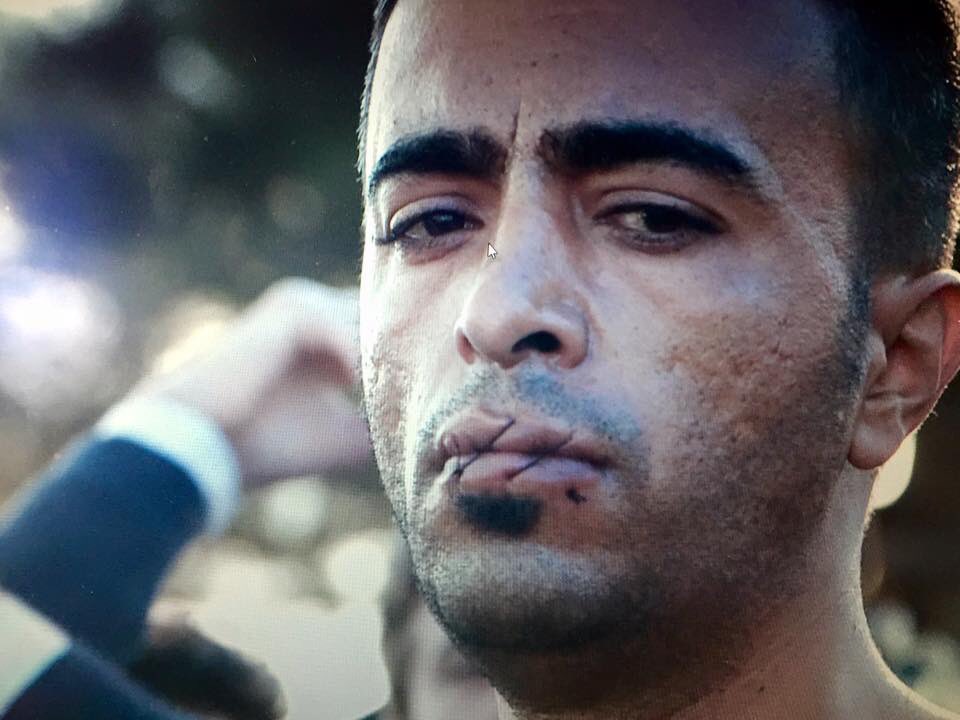
Hunger strike on the #Macedonia / #Greece border. Harrowing photo shared by Fedja Grulovic of @Reuters: image via Valerie Hopkins @VALERIEin140, 23 November 2015
Stranded migrants block railway, call hunger strike: Yannis Behrakis, Reuters, 23 November 2015
Moroccans, Iranians and Pakistanis on Greece’s northern border with
Macedonia blocked rail traffic and demanded passage to western Europe on
Monday, stranded by a policy of filtering migrants in the Balkans that
has raised human rights concerns.
One Iranian man, declaring a hunger strike, stripped to the waist, sewed his lips together with nylon and sat down in front of lines of Macedonian riot police.
Asked by Reuters where he wanted to go, the man, a 34-year-old electrical engineer named Hamid, said: "To any free country in the world. I cannot go back. I will be hanged."
Hundreds of thousands of migrants, many of them Syrians fleeing war, have made the trek across the Balkan peninsula having arrived by boat and dinghy to Greece from Turkey, heading for the more affluent countries of northern and western Europe, mainly Germany and Sweden.
Last week, however, Slovenia, a member of Europe’s Schengen zone of passport-free travel, declared it would only grant passage to those fleeing conflict in Syria, Iraq and Afghanistan, and that all others deemed "economic migrants" would be sent back.
That prompted others on the route -- Croatia, Serbia and Macedonia -- to do the same, leaving growing numbers stranded in tents and around camp fires on Balkan borders with winter approaching.
Rights groups have questioned the policy, warning asylum should be granted on merit, not on the basis of nationality.
"To classify a whole nation as economic migrants is not a principle recognized in international law," said Rados Djurovic, director of the Belgrade-based Asylum Protection Center. "We risk violating human rights and asylum law," he told Serbian state television.
The new measure coincides with rising concern, particularly on the political right in Europe, over the security risk of the chaotic and often unchecked flow of humanity into Europe in the aftermath of the Nov. 13 attacks in Paris by Islamist militants in which 130 people died.
It has emerged that two suicide bombers involved in the attacks took the same trail, arriving by boat in Greece and then traveling north across the Balkans. Most of the attackers, however, were citizens of France or Belgium.
On the Macedonian-Greek border, crowds of Moroccans, Iranians and others blocked the railway line running between the two countries, halting at least one train that tried to cross, a Reuters photographer said.
A group of Bangladeshis had stripped to the waist and written slogans on their chests in red paint. "Shoot us, we never go back," read one. "Shoot us or save us," read another.

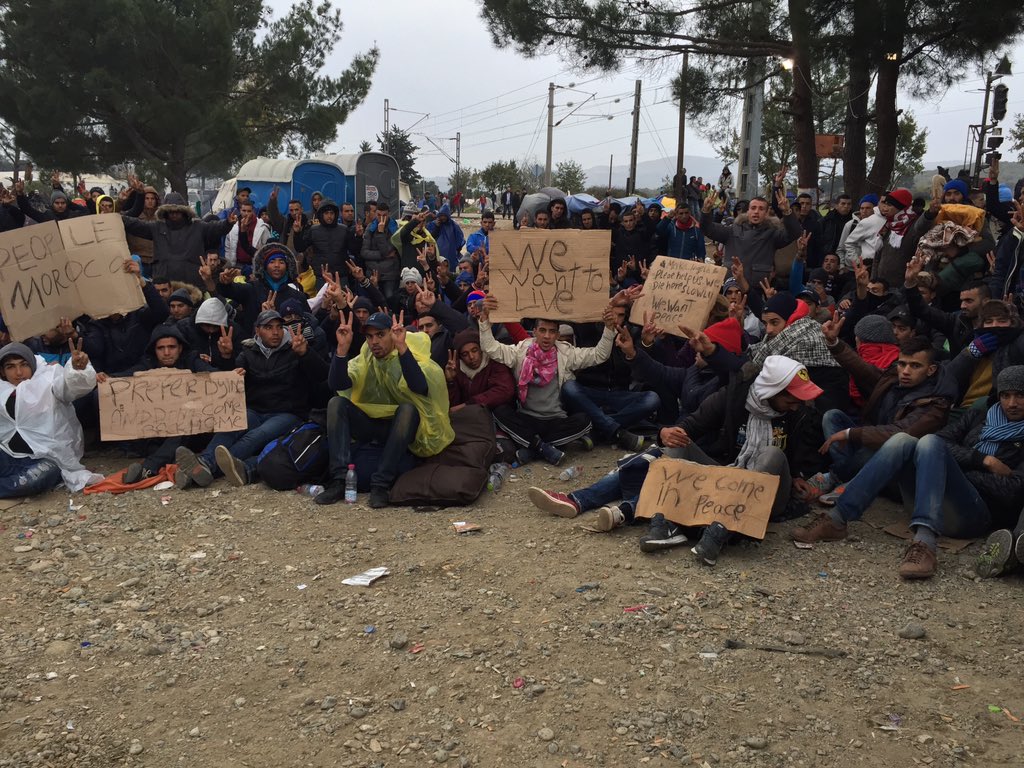
#refugees stuck on #Greece #Macedonia border continue their protest to get border open. Some here 4-5 days: image via Lydia Gall @LydsG, 22 November 2015
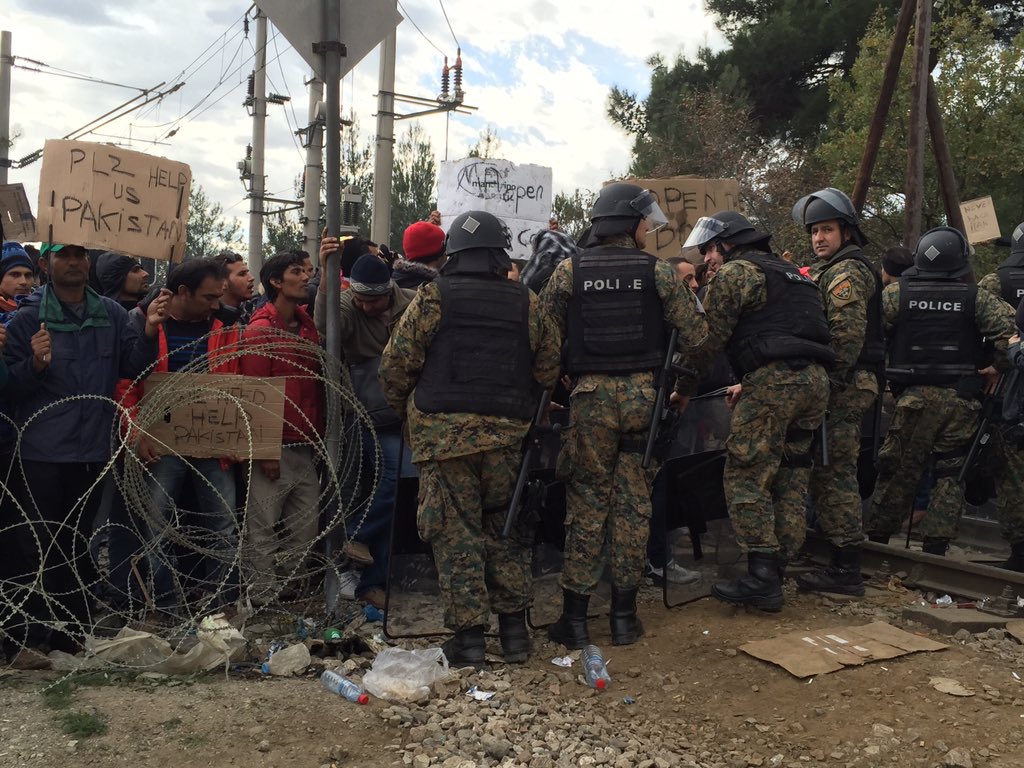
#refugees chanting "open border!" on #Greece border with #Macedonia. Stuck for days.: image via Lydia Gall @LydsG, 22 November 2015
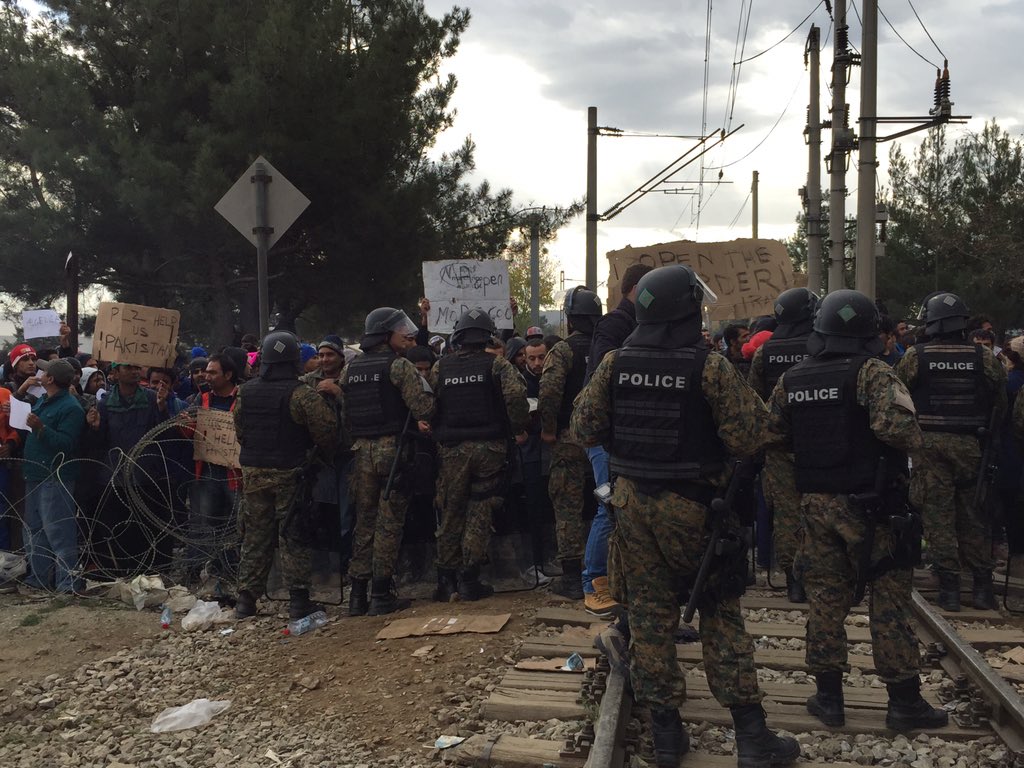
#refugees chanting "open border!" on #Greece border with #Macedonia. Stuck for days.: image via Lydia Gall @LydsG, 22 November 2015
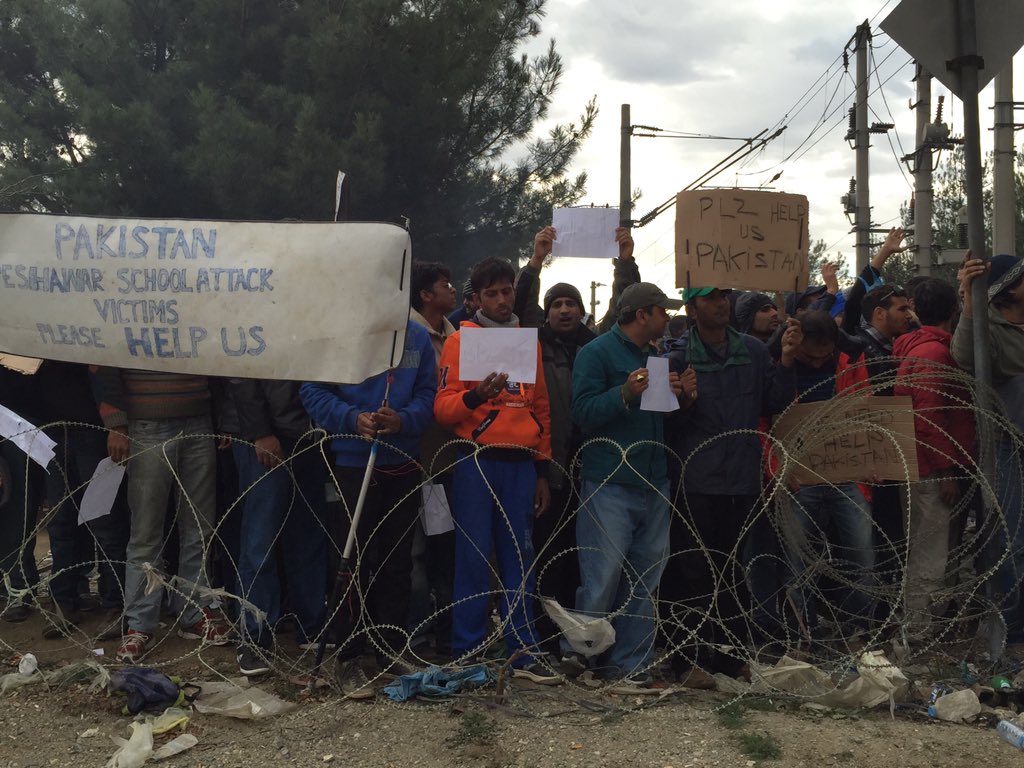
#refugees chanting "open border!" on #Greece border with #Macedonia. Stuck for days.: image via Lydia Gall @LydsG, 22 November 2015
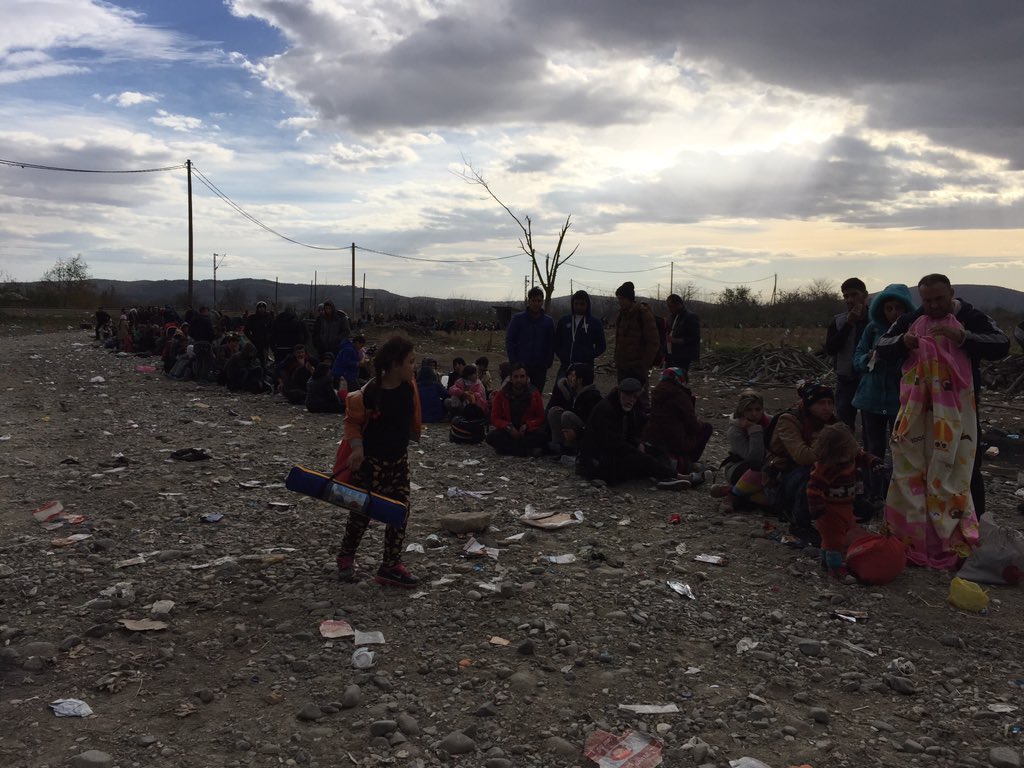
1000s #Refugees from Syria, Afghanistan, Iraq waiting for hours to access Gevgelija camp in #Macedonia image via Lydia Gall @LydsG, 22 November 2015
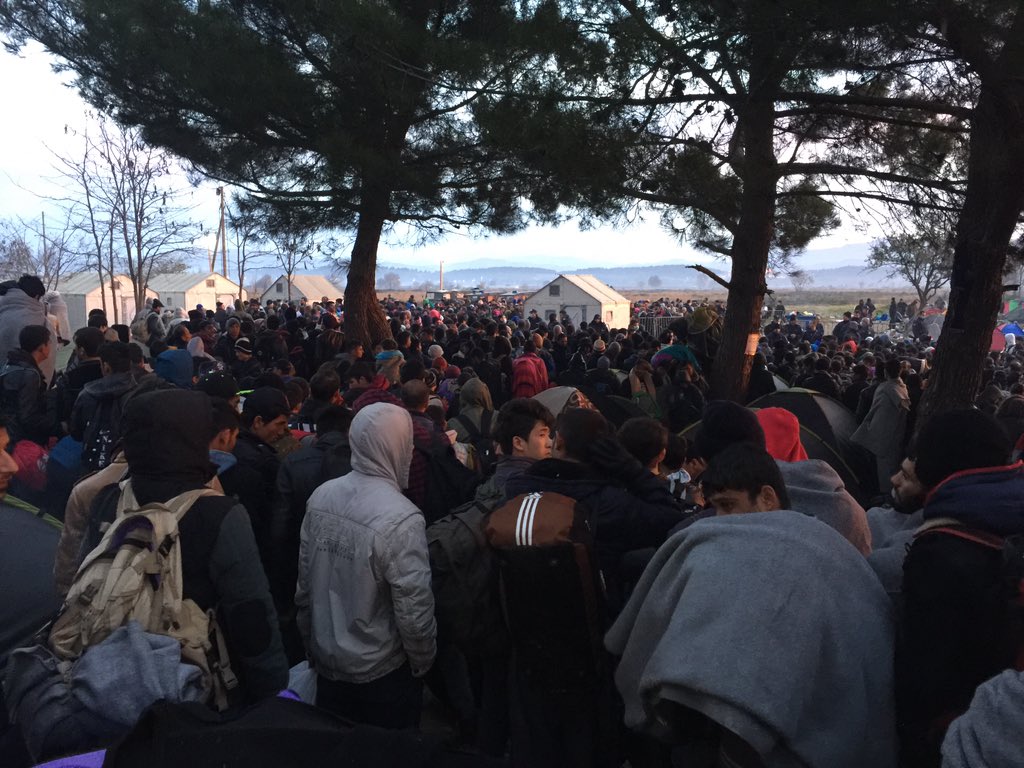
Dawn at #Greece #Macedonia border. 1000s #refugees stuck, sleeping on tracks bc cascading border closures: image via Lydia Gall @LydsG, 21 November 2015
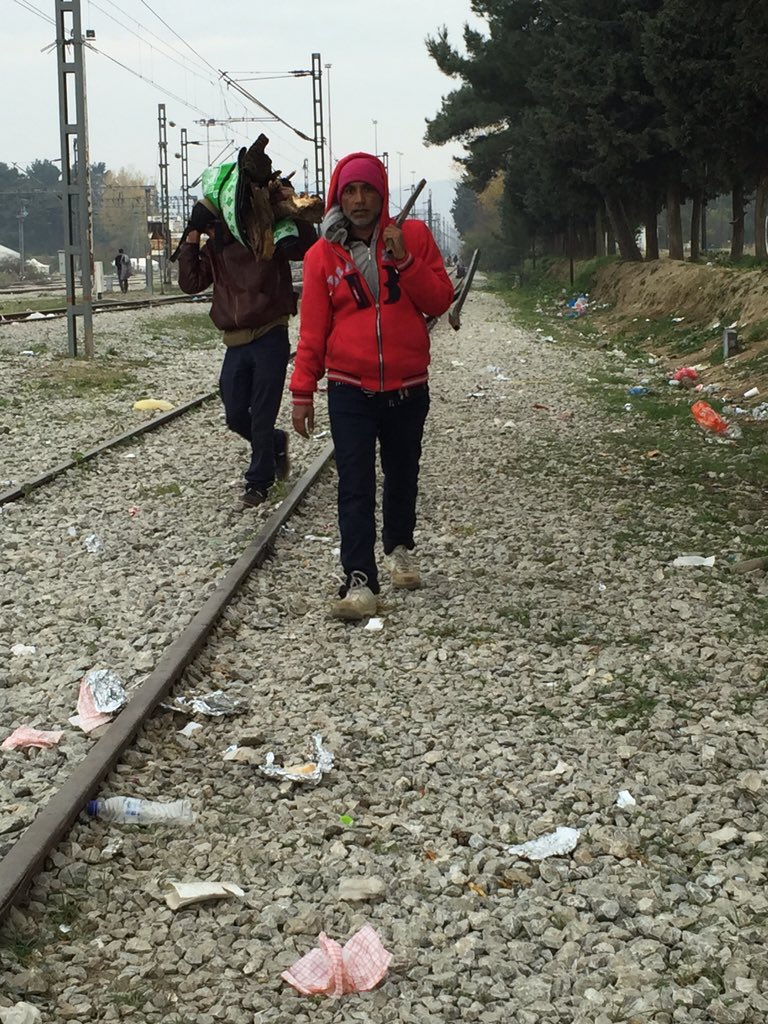
About 5000 #refugees expected 2day in Idomeni #Greece. Only Syrians, Iraqis, Afghans 2 pass. Others 4 days in cold.: image via Lydia Gall @LydsG, 21 November 2015
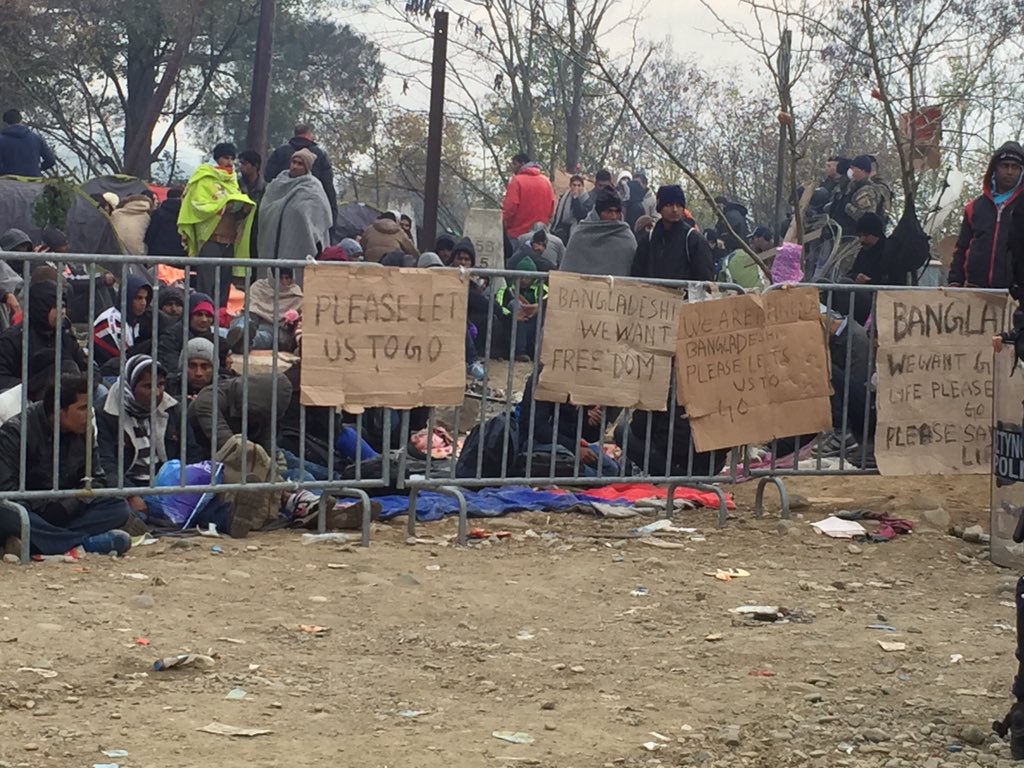
Segregation @ borders in full swing. Only Syrians, Iraqis and Afghans let through 2 #Macedonia ##refugeesGR.: image via Lydia Gall @LydsG, 21 November 2015
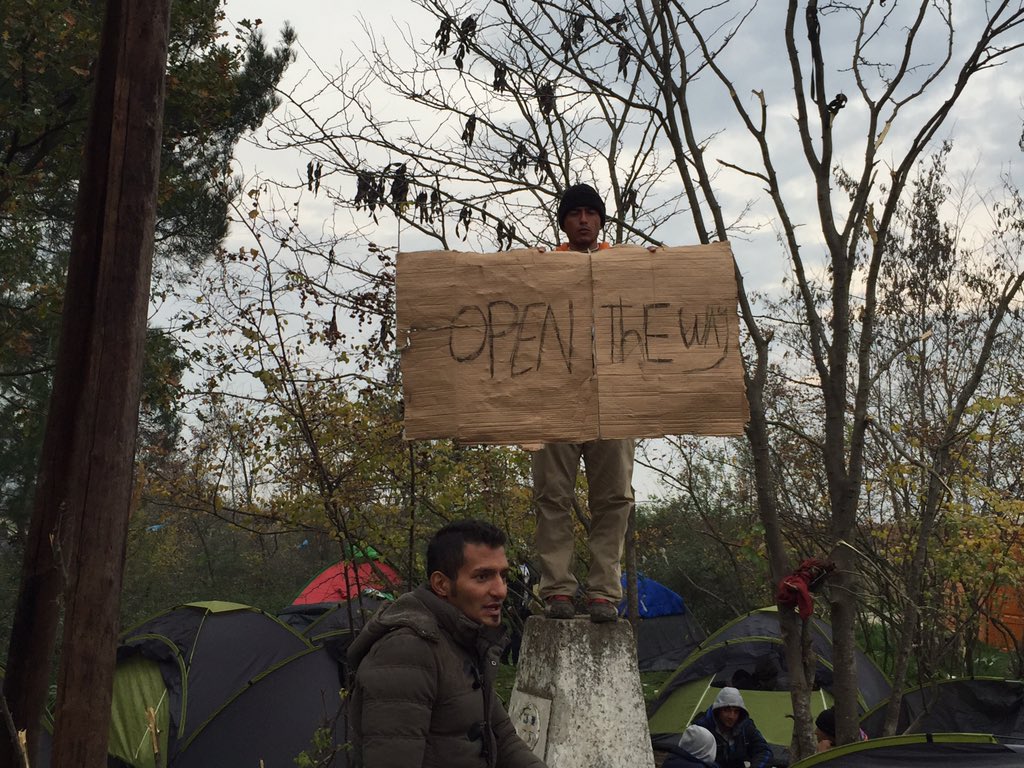
"We prefer to die here bc in #Iran govt will kill us." 1000s ppl stuck @ #Greece #Macedonia border##refugeesGR @hrw: image via Lydia Gall @LydsG, 21 November 2015
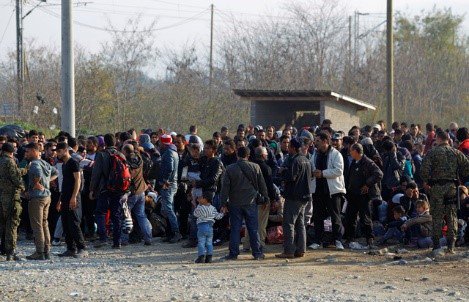
New discriminatory border practices by 3EU & other Western Balkans govts put people at risk:: image via Lydia Gall @LydsG, 20 November 2015
One Iranian man, declaring a hunger strike, stripped to the waist, sewed his lips together with nylon and sat down in front of lines of Macedonian riot police.
Asked by Reuters where he wanted to go, the man, a 34-year-old electrical engineer named Hamid, said: "To any free country in the world. I cannot go back. I will be hanged."
Hundreds of thousands of migrants, many of them Syrians fleeing war, have made the trek across the Balkan peninsula having arrived by boat and dinghy to Greece from Turkey, heading for the more affluent countries of northern and western Europe, mainly Germany and Sweden.
Last week, however, Slovenia, a member of Europe’s Schengen zone of passport-free travel, declared it would only grant passage to those fleeing conflict in Syria, Iraq and Afghanistan, and that all others deemed "economic migrants" would be sent back.
That prompted others on the route -- Croatia, Serbia and Macedonia -- to do the same, leaving growing numbers stranded in tents and around camp fires on Balkan borders with winter approaching.
Rights groups have questioned the policy, warning asylum should be granted on merit, not on the basis of nationality.
"To classify a whole nation as economic migrants is not a principle recognized in international law," said Rados Djurovic, director of the Belgrade-based Asylum Protection Center. "We risk violating human rights and asylum law," he told Serbian state television.
The new measure coincides with rising concern, particularly on the political right in Europe, over the security risk of the chaotic and often unchecked flow of humanity into Europe in the aftermath of the Nov. 13 attacks in Paris by Islamist militants in which 130 people died.
It has emerged that two suicide bombers involved in the attacks took the same trail, arriving by boat in Greece and then traveling north across the Balkans. Most of the attackers, however, were citizens of France or Belgium.
On the Macedonian-Greek border, crowds of Moroccans, Iranians and others blocked the railway line running between the two countries, halting at least one train that tried to cross, a Reuters photographer said.
A group of Bangladeshis had stripped to the waist and written slogans on their chests in red paint. "Shoot us, we never go back," read one. "Shoot us or save us," read another.
Discrimination within Chaos

Balkan border fence: image via Lydia Gall @LydsG, 23 November 2015

#refugees stuck on #Greece #Macedonia border continue their protest to get border open. Some here 4-5 days: image via Lydia Gall @LydsG, 22 November 2015

#refugees chanting "open border!" on #Greece border with #Macedonia. Stuck for days.: image via Lydia Gall @LydsG, 22 November 2015

#refugees chanting "open border!" on #Greece border with #Macedonia. Stuck for days.: image via Lydia Gall @LydsG, 22 November 2015

#refugees chanting "open border!" on #Greece border with #Macedonia. Stuck for days.: image via Lydia Gall @LydsG, 22 November 2015

1000s #Refugees from Syria, Afghanistan, Iraq waiting for hours to access Gevgelija camp in #Macedonia image via Lydia Gall @LydsG, 22 November 2015

Dawn at #Greece #Macedonia border. 1000s #refugees stuck, sleeping on tracks bc cascading border closures: image via Lydia Gall @LydsG, 21 November 2015

About 5000 #refugees expected 2day in Idomeni #Greece. Only Syrians, Iraqis, Afghans 2 pass. Others 4 days in cold.: image via Lydia Gall @LydsG, 21 November 2015

Segregation @ borders in full swing. Only Syrians, Iraqis and Afghans let through 2 #Macedonia ##refugeesGR.: image via Lydia Gall @LydsG, 21 November 2015

"We prefer to die here bc in #Iran govt will kill us." 1000s ppl stuck @ #Greece #Macedonia border##refugeesGR @hrw: image via Lydia Gall @LydsG, 21 November 2015

New discriminatory border practices by 3EU & other Western Balkans govts put people at risk:: image via Lydia Gall @LydsG, 20 November 2015
Unspeakable
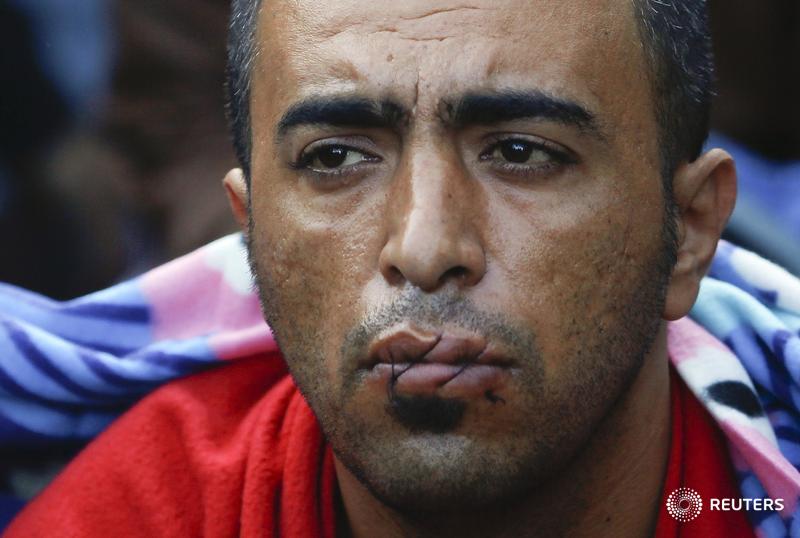
"I cannot go back. I will be hanged." Stranded migrants block railway, call hunger strike.: image via Reuters Top News @Reuters, 23 November 2015
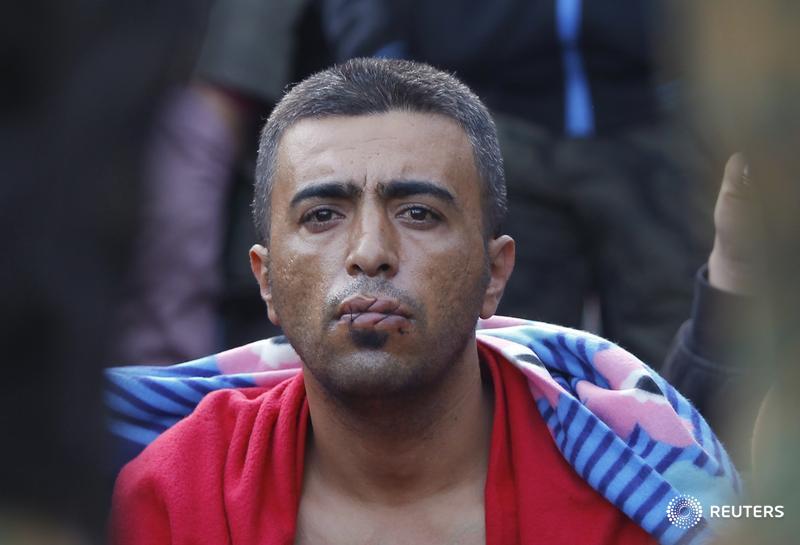
Stranded migrants block railway, call hunger strike: image via Reuters Top News @Reuters, 23 November 2015

#Eidomeni #FortressEurope #refugeesGr [photo Sakis Mitrolidis #AFP]: image via dromografos @dromografos, 23 November 2015
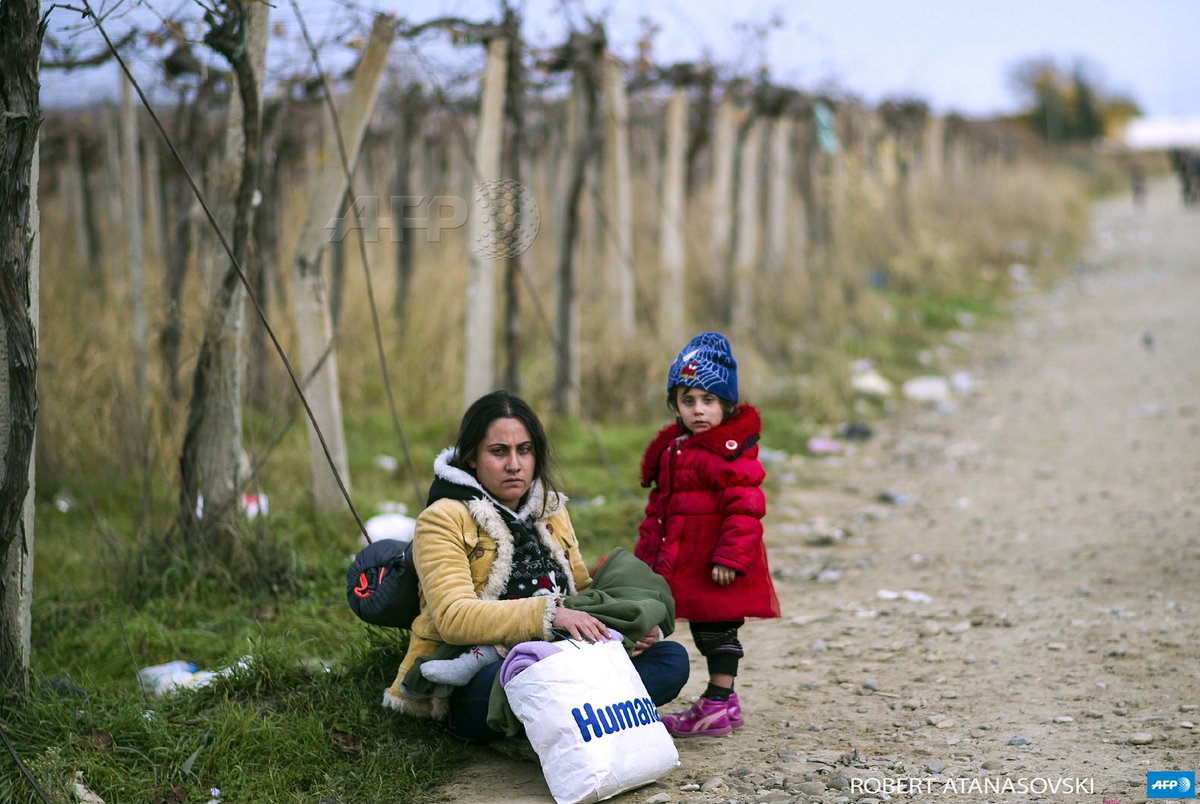
MACEDONIA - Migrants wait to enter a registration camp after crossing border near Gevgelija. By @RAtanasovski #AFP: image via Frédérique Geffard @fgeffard, 22 November 2015
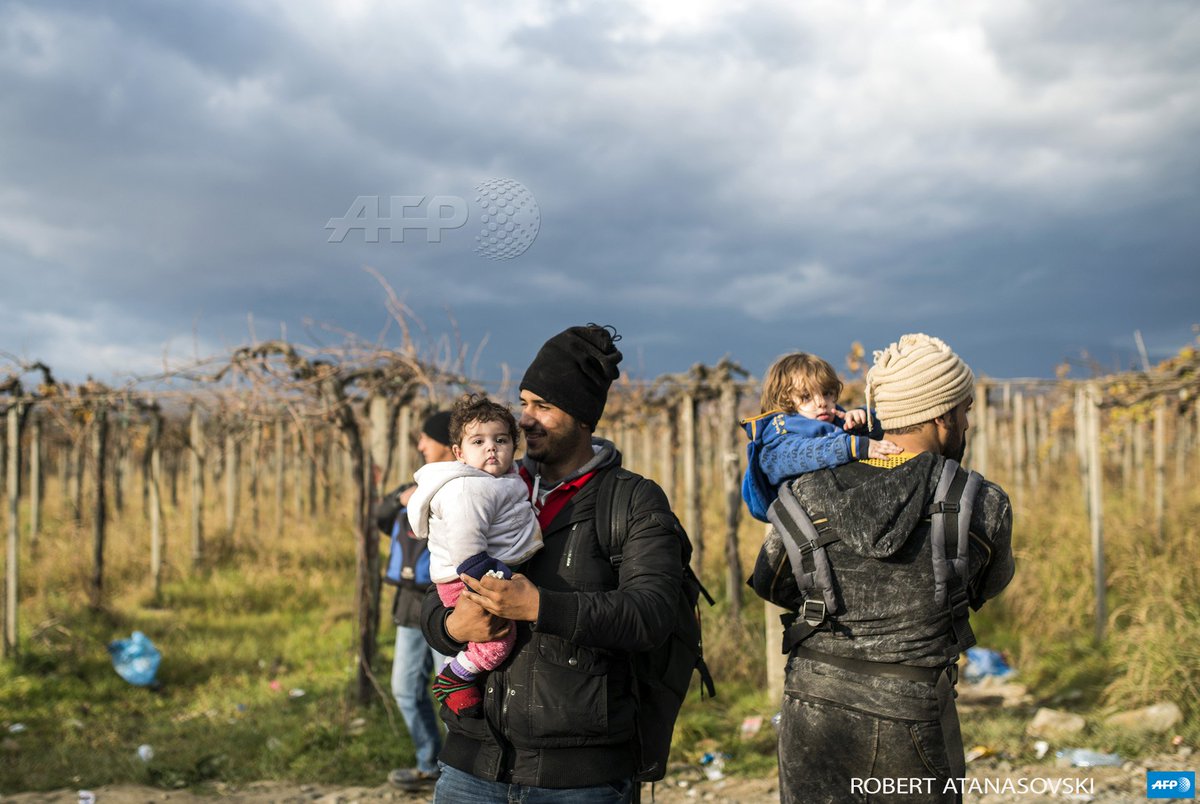
MACEDONIA - Migrants wait to enter a registration camp after crossing border near Gevgelija. By @RAtanasovski #AFP: image via Frédérique Geffard @fgeffard, 22 November 2015
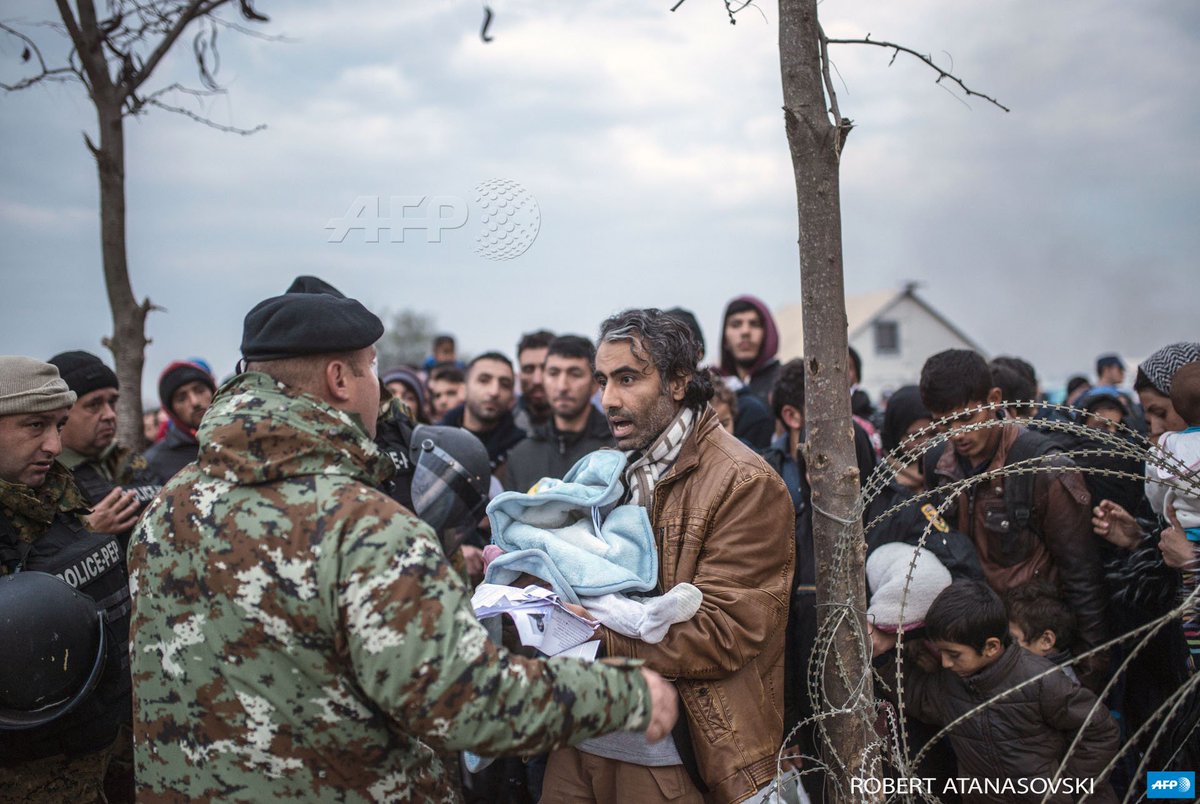
MACEDONIA - A migrant & his baby cross the Greek-Macedonian border near Gevgelija. By @RAtanasovski #AFP: image via AFP Photo Department @AFPphoto, 22 November 2015
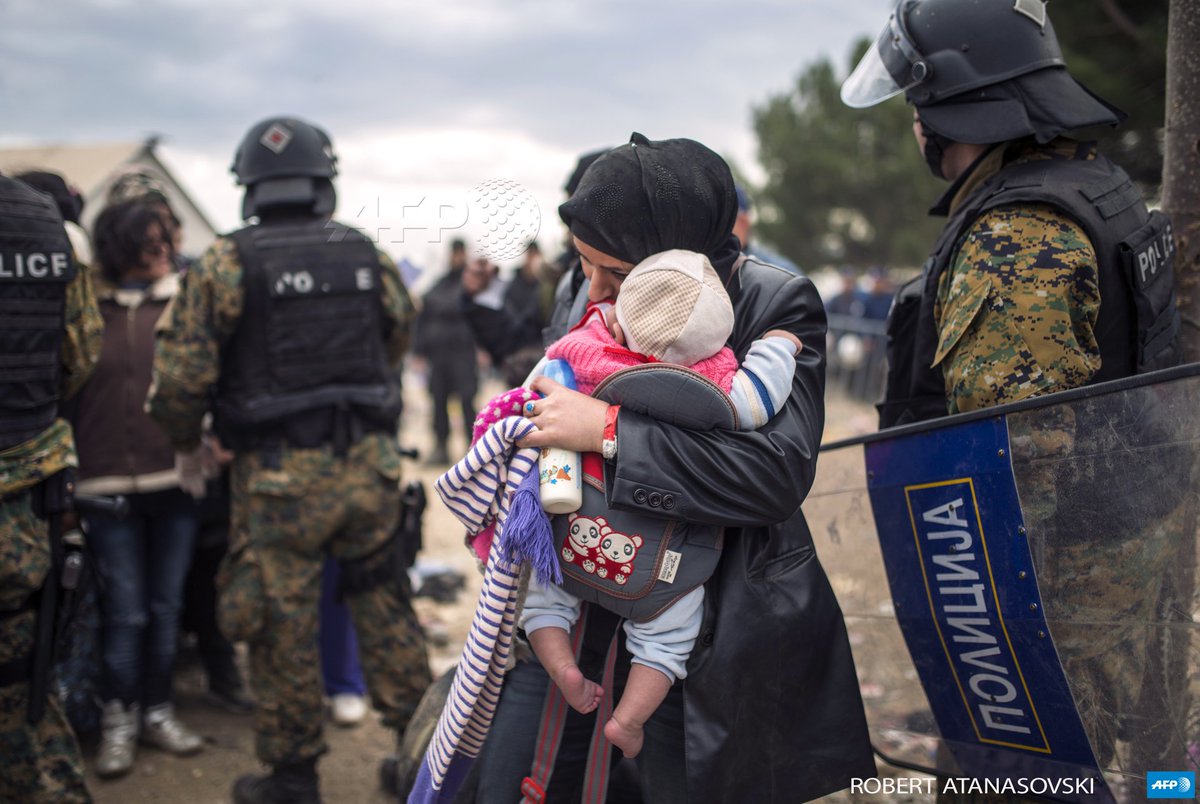
MACEDONIA - A migrant woman and her baby cross the Greek-Macedonian border near Gevgelija. By @RAtanasovski #AFP: image via AFP Photo Department @AFPphoto, 22 November 2015
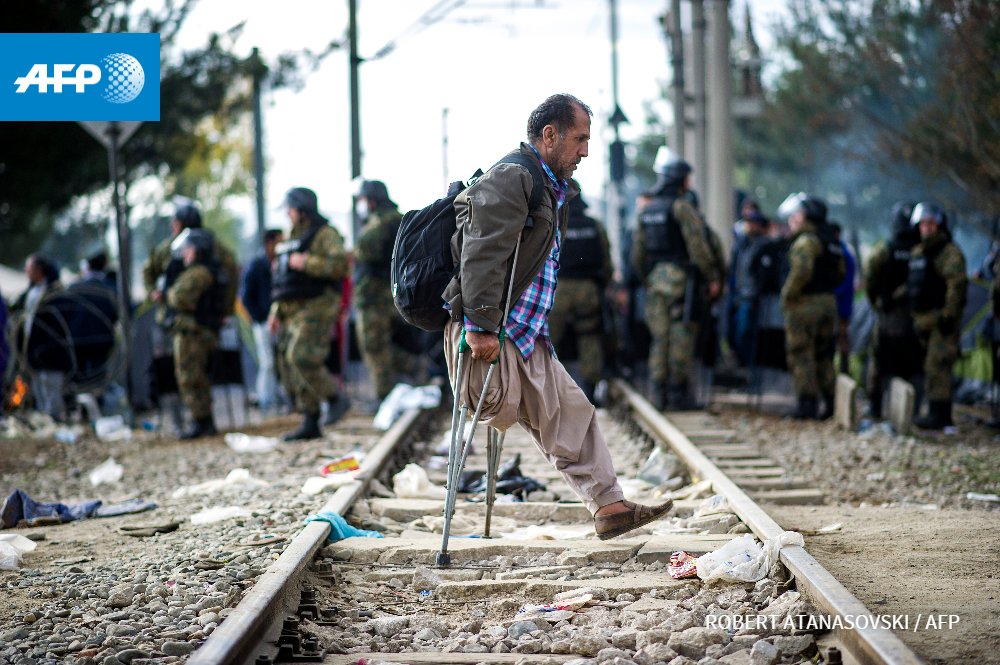
#migrants refugees from Iran with their mouths sewn shut sit on railway tracks, near Gevgelija.#AFP @RAtanasovski #AFP: image via Aurelia BAILLY @AureliaBAILLY, 23 November 2015
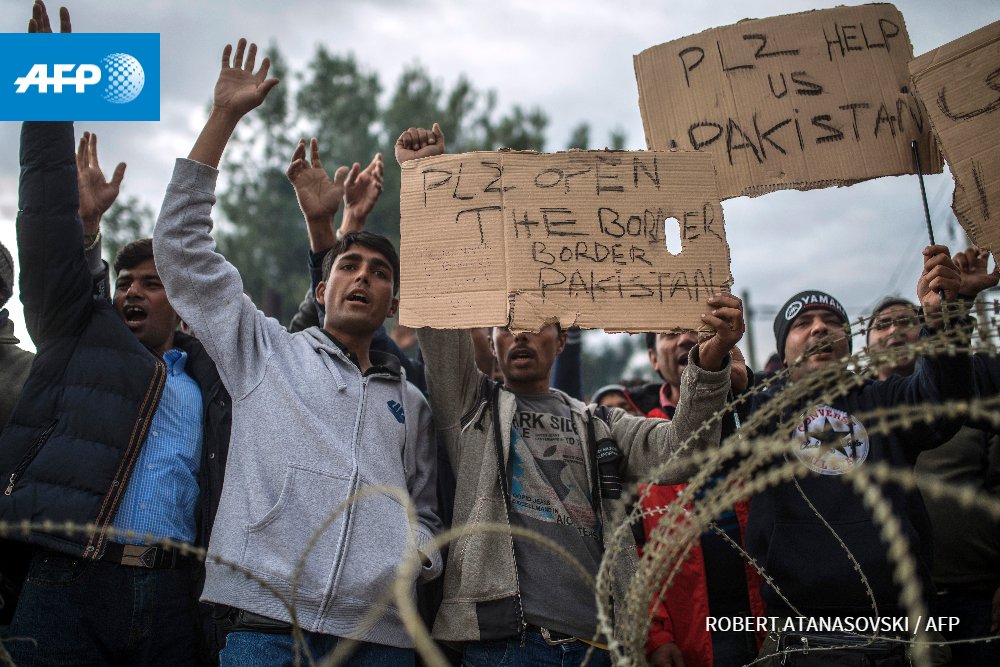
#migrants refugees from Iran with their mouths sewn shut sit on railway tracks, near Gevgelija.#AFP @RAtanasovski #AFP: image via Aurelia BAILLY @AureliaBAILLY, 23 November 2015
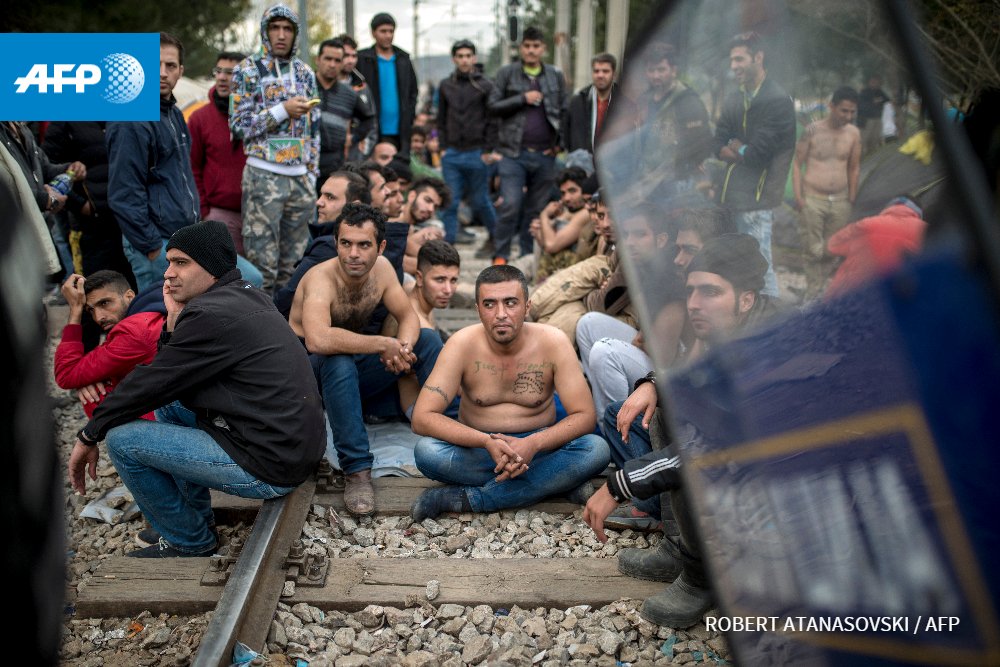
#migrants refugees from Iran with their mouths sewn shut sit on railway tracks, near Gevgelija.#AFP @RAtanasovski #AFP: image via Aurelia BAILLY @AureliaBAILLY, 23 November 2015
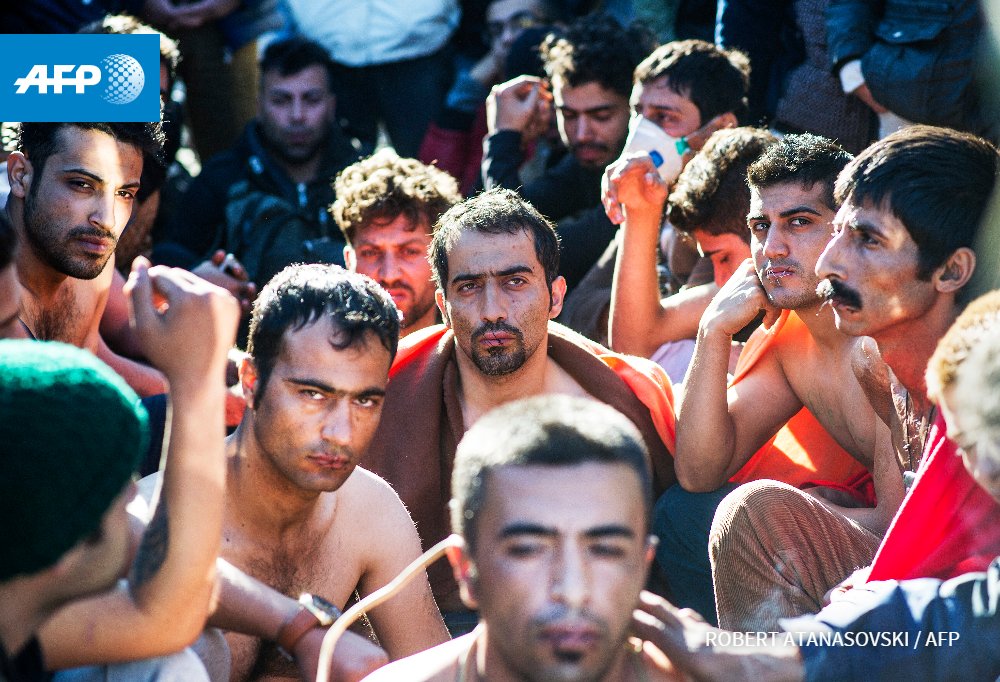
#migrants refugees from Iran with their mouths sewn shut sit on railway tracks, near Gevgelija.#AFP @RAtanasovski #AFP: image via Aurelia BAILLY Verified account @AureliaBAILLY, 23 November 2015
Joseph Ceravolo: Starvation
........................................ December 6, 1987
For the new crusaders tired and dusty
from the trek across the Dardanelles
felt diseased and lost
abandoned and tricked
death upon death
Lord upon Lord
the holy children wept.
While an ailanthus tree crushes
its way between close buildings
the space between an alley and a dream.
Saints martyred
find their way through dead forests
by the Holy of the Empire.
Empire upon empiredeath upon death
Lord upon Lord
the holy children wept.
While an ailanthus tree crushes
its way between close buildings
the space between an alley and a dream.
Saints martyred
find their way through dead forests
Holy bridges span the straits
bound for the change
and the chance to begin another life.
A drunken crusader, lost
for the past years,
abandoned his children, his woman,
winds along the street
looking for wine, the harvest
and the abandoned salvation.
The taxes in the land
drive him further away, no sword
no word, no control while wine fills the veins.
He must get off and sleep.
The garbage of the city speaks,
"You are all eternal."
"You are all eternal."
Charge the sudden dream with breath
The armor tears down
the muscles of the lofty body
now worn and skeletal, starved
of food, love and the home.
Cruelty, plots, destruction of innocent souls
and the body of the city weeps.
The seasons end.
We must get off and sleep.
Sleep forever in a divine swoon
that ends the hope of the gods. Thin
in the dirt of the deserts, death
like a kiss upon the abdomen.
Suffering takes place in gold
as well as excrement,
and so the journey ends
and poison begins its hold
on limpid flesh, the rattles shake
ugliness chortles in joy
The song of death perspires in
the Warsaw of the eyes.
Good tidings good food good holyday, goodbye
The boat that leaves Golgotha
is in the Charon of dreams.
They must get off and sleep.
Joseph Ceravolo (1934-1988): Starvation (December 6, 1987), from Collected Poems, 2012
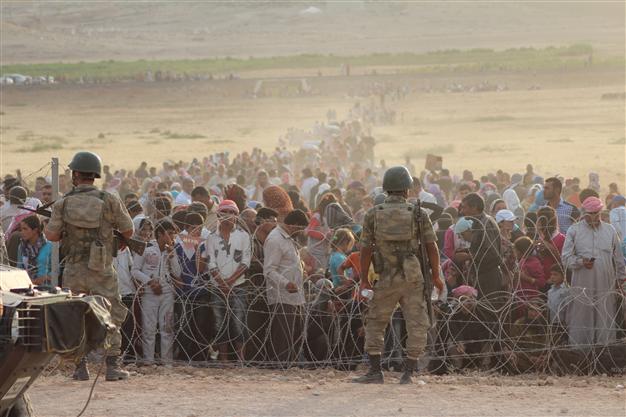
Syrians fleeing Russia airstrikes pushed back at Turkish border @HRW: image via Gerry Simpson @Gerry Simpson, 23 November 2015 Vienna, Austria
Battle Stations
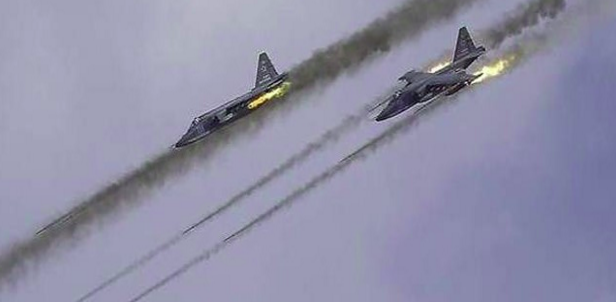
Syrians fleeing Russia airstrikes pushed back at Turkish border @HRW: image via Gerry Simpson @Gerry Simpson, 23 November 2015 Vienna, Austria
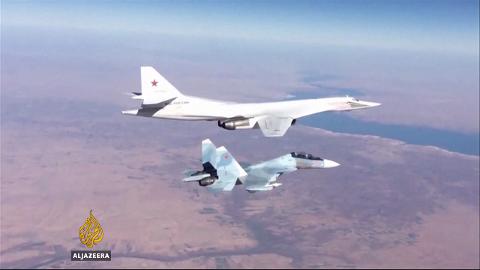
Russian bombers reportedly killed 403 Syrian civilians since Sept, including 97 children: image via Kenneth Roth @KenRoth, 23 November 2015
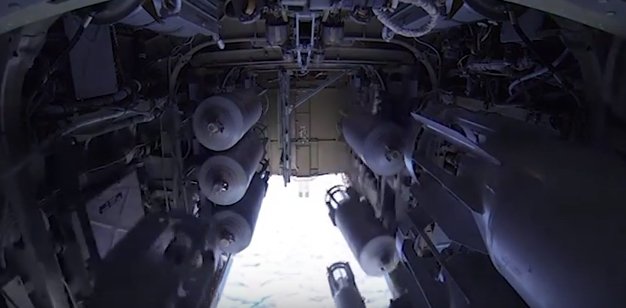
Russian carpet bombing in Syria with these dumb bombs is no way to avoid civilian casualties: image via Kenneth Roth @KenRoth, 23 November 2015
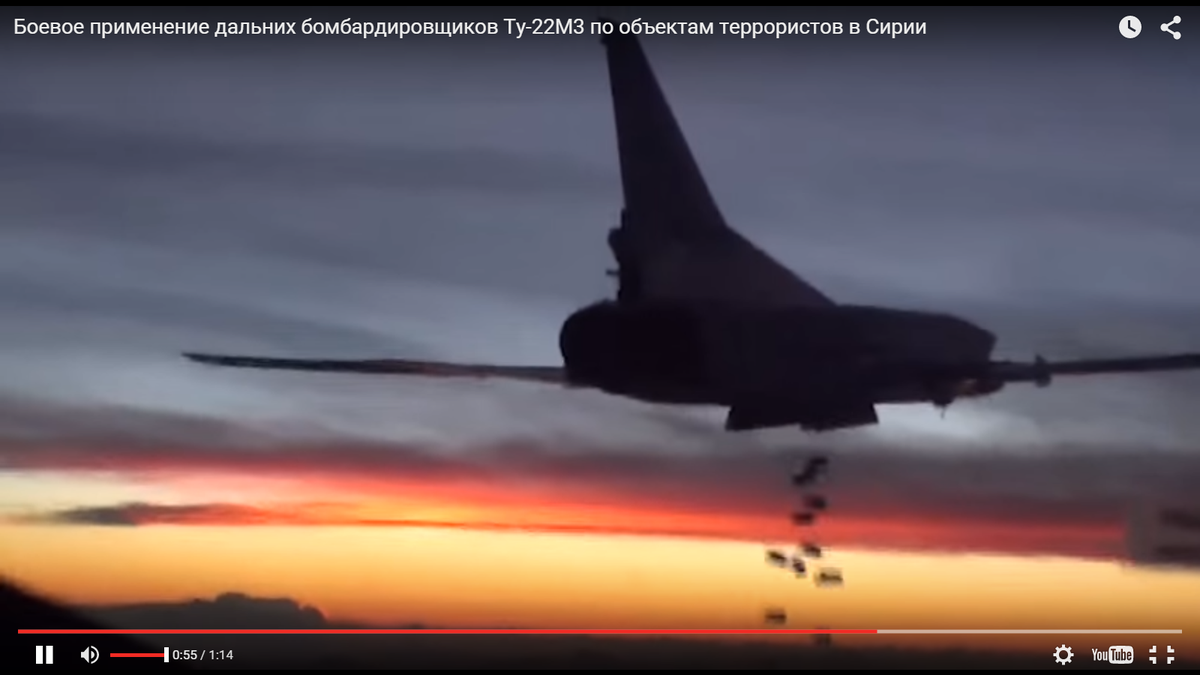
Russian carpet bombing in Syria with these dumb bombs is no way to avoid civilian casualties: image via Kenneth Roth @KenRoth, 23 November 2015
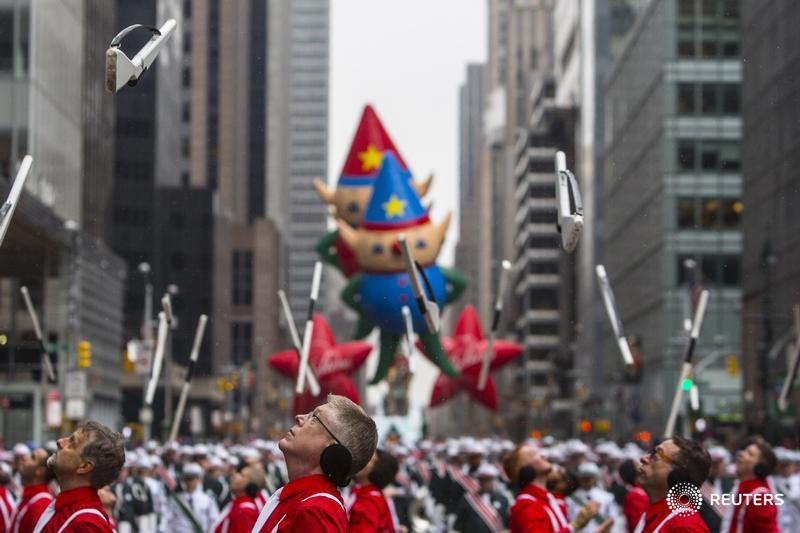
As Islamic State threat looms, NYPD will be out in full force for Thanksgiving parade: image via Reuters Top News
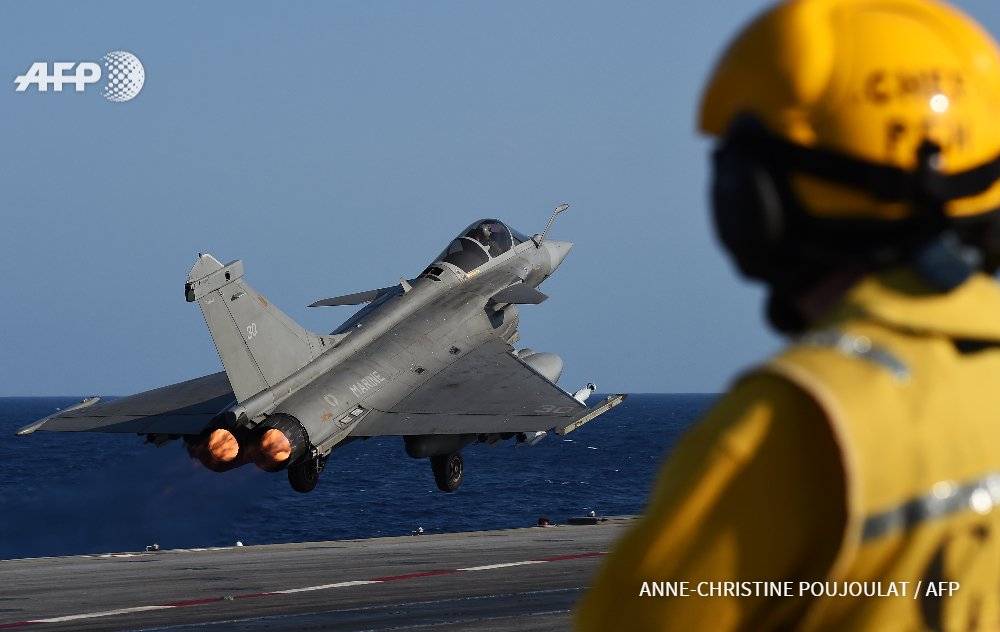
France launches missions over Syria, Iraq from newly deployed carrier: military: image via Agence France-Presse @AFP, 23 November 2015
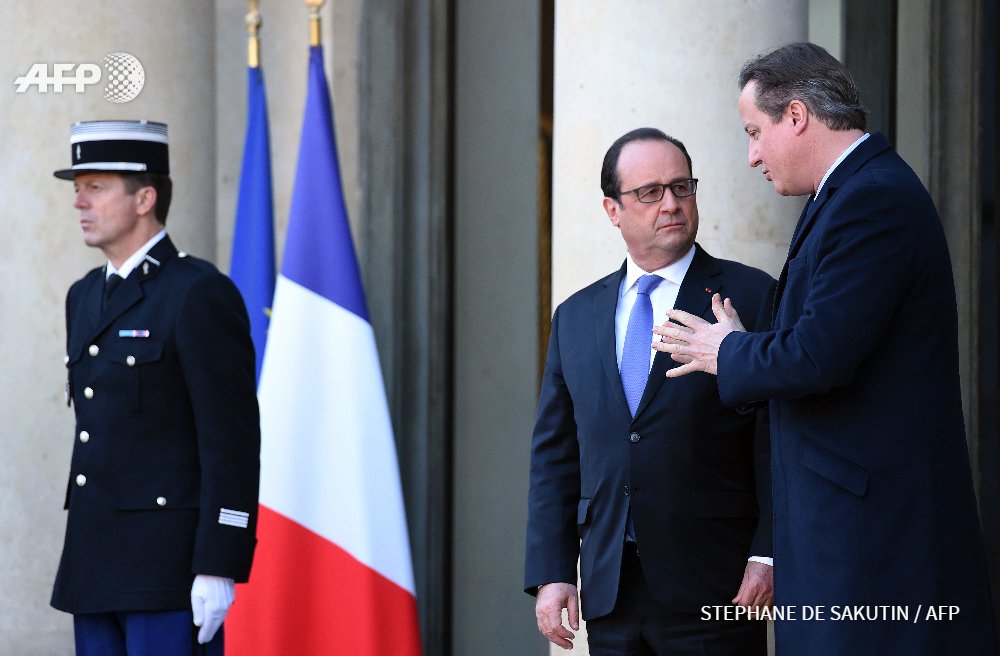
#UPDATE Cameron says offered France use of British airbase in Cyprus: image via Agence France-Presse @AFP, 23 November 2015



2 comments:
Empire upon empire
death upon death
Lord upon Lord
the holy children wept.
A poem full of ghosts. We've forgotten how to pay attention and history's horrors peeping through each crack.
Yes. Something fragile seems to drift through it all but unseen.
The Warsaw of the eyes
Saw death falling from the skies...
Post a Comment